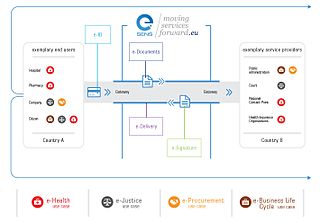
The economy of Luxembourg is largely dependent on the banking, steel, and industrial sectors. Citizens of Luxembourg enjoy the second highest per capita gross domestic product in the world, according to an IMF estimate in 2022.

Interoperability is a characteristic of a product or system to work with other products or systems. While the term was initially defined for information technology or systems engineering services to allow for information exchange, a broader definition takes into account social, political, and organizational factors that impact system-to-system performance.
E-government is the use of technological communications devices, such as computers and the Internet, to provide public services to citizens and other persons in a country or region. E-government offers new opportunities for more direct and convenient citizen access to government and for government provision of services directly to citizens.

The Cotonou Agreement is a treaty between the European Union and the African, Caribbean and Pacific Group of States. It was signed in June 2000 in Cotonou, Benin's largest city, by 78 ACP countries and the then fifteen Member States of the European Union. It entered into force in 2003 and was subsequently revised in 2005 and 2010.
A cybersecurity regulation comprises directives that safeguard information technology and computer systems with the purpose of forcing companies and organizations to protect their systems and information from cyberattacks like viruses, worms, Trojan horses, phishing, denial of service (DOS) attacks, unauthorized access and control system attacks. There are numerous measures available to prevent cyberattacks.
The Framework Programmes for Research and Technological Development, also called Framework Programmes or abbreviated FP1 to FP9, are funding programmes created by the European Union/European Commission to support and foster research in the European Research Area (ERA). Starting in 2014, the funding programmes were named Horizon.
The Task Force for National Strategy for Information Society Development was a group of experts gathered for the purpose of creating the National Strategy for Information Society Development for North Macedonia.
Government procurement or public procurement is undertaken by the public authorities of the European Union (EU) and its member states in order to award contracts for public works and for the purchase of goods and services in accordance with principles derived from the Treaties of the European Union. Such procurement represents 13.6% of EU GDP as of 2018, and has been the subject of increasing European regulation since the 1970s because of its importance to the European single market.

The European Union Public Licence (EUPL) is a free software licence that was written and approved by the European Commission. The licence is available in 23 official languages of the European Union. All linguistic versions have the same validity. Its latest version, EUPL v1.2, was published in May 2017. Revised documentation for v1.2 was issued in late‑2021.

Government procurement or public procurement is the procurement of goods, services and works on behalf of a public authority, such as a government agency. Amounting to 12 percent of global GDP in 2018, government procurement accounts for a substantial part of the global economy.
The Open Source Observatory and Repository (OSOR) is an online project launched by the European Commission under the IDABC programme, to support the distribution and re-use of software developed by or for public sector administrations across Europe, connecting EU services and Member States.
The Semantic Interoperability Community Europe (SEMIC.EU) was an eGovernment service initiated by the European Commission and managed by the Interoperable Delivery of European eGovernment Services to public Administrations, Businesses and Citizens (IDABC) Unit. As one of the 'horizontal measures' of the IDABC, it was established as a permanent implementation of the principles stipulated in the 'European Interoperability Framework' (EIF). It offered a service for the exchange of semantic interoperability solutions, with a focus on demands of eGovernment in Europe. Through the establishment of a single sharing and collaboration point, the European Union wanted to resolve the problems of semantic interoperability amongst the EU member states. The main idea behind the service was to make visible specifications that already exist, so as to increase their reuse. In this way, governmental agencies and developers benefit as they do not reinvent the wheel, they reduce development costs, and increase the interoperability of their systems.
All European countries show eGovernment initiatives, mainly related to the improvement of governance at the national level. Significant eGovernment activities also take place at the European Commission level as well. There is an extensive list of eGovernment Fact Sheets maintained by the European Commission.
The European Health Forum Gastein (EHFG) nicknamed the 'Davos for Public Health' is a non-profit and non-partisan association led by Dr. Clemens Martin Auer (President) and Dorli Kahr-Gottlieb . The EHFG is the leading health policy conference in Europe. The main objective is to facilitate the establishment of a framework for advising and developing European health policy while recognising the principle of subsidiarity. In doing so, many connections with partners from across all sectors involved in health policy, public health and health care were created. Supported by the European Commission, the Austrian Ministry of Health and many more, the EHFG offers an unparalleled opportunity to exchange information about a broad spectrum of contemporary health issues.
Immigration Policy 2.0 is a European Union project that aims to facilitate the participation and involvement of immigrant citizens in immigration policies framed in the Competitiveness and Innovation Framework Program (CIP)

Joinup is a collaboration platform created by the European Commission. It is funded by the European Union via its Interoperability Solutions for Public Administrations Programme.

On 6 May 2015, the European Commission, led at the time by Jean-Claude Juncker, established the Digital Single Market strategy, intended to remove virtual borders, boost digital connectivity, and make it easier for consumers to access cross-border online content across the European Union. The Digital Single Market, which is one of the Commission's 10 political priorities, aims to fit the EU's single market for the digital age, moving from 28 national digital markets to a single one, and then opening up digital services to all citizens and strengthen business competitiveness in the digital economy. In other words, the Digital Single Market is a market characterized by ensuring the free movement of people, services and capital and allowing individuals and businesses to seamlessly access and engage in online activities irrespective of their nationality or place of residence. Fair competition conditions and a high level of protection of personal and consumer data are applied.
Electronic Platform of Public Administration Services (ePUAP) is a Polish nationwide platform for communication of citizens with public administrations in a uniform and standardized way. Built as part of the ePUAP-WKP project. Service providers are public administration units and public institutions.
The once-only principle is an e-government concept that aims to ensure that citizens, institutions, and companies only have to provide certain standard information to the authorities and administrations once. By incorporating data protection regulations and the explicit consent of the users, the public administration is allowed to re-use and exchange the data with each other. The once-only principle is part of the European Union's (EU) plans to further develop the Digital Single Market by reducing the administrative burden on citizens and businesses.

The Capital Markets Union (CMU) is an economic policy initiative launched by the former president of the European Commission, Jean-Claude Junker in the initial exposition of his policy agenda on 15 July 2014. The main target was to create a single market for capital in the whole territory of the EU by the end of 2019. The reasoning behind the idea was to address the issue that corporate finance relies on debt (i.e. bank loans) and the fact that capital markets in Europe were not sufficiently integrated so as to protect the EU and especially the Eurozone from future crisis. The Five Presidents Report of June 2015 proposed the CMU in order to complement the Banking union of the European Union and eventually finish the Economic and Monetary Union (EMU) project. The CMU is supposed to attract 2000 billion dollars more on the European capital markets, on the long-term.







